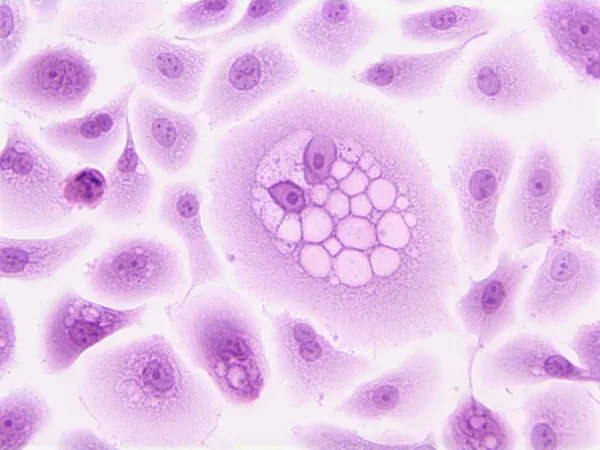
Revolutionary AI Developed by Scientists Predicts Cell Activity with Unprecedented Accuracy!
2025-01-08
Author: Mei
Revolutionary AI Developed by Scientists Predicts Cell Activity with Unprecedented Accuracy!
In a groundbreaking development at Columbia University Vagelos College of Physicians and Surgeons, researchers have harnessed a new artificial intelligence (AI) methodology capable of predicting gene activity in any human cell. Published in the renowned journal *Nature*, this innovative system promises to revolutionize scientific efforts to unravel the mysteries of biological processes, notably in areas such as cancer research and genetic diseases.
Professor Raul Rabadan, a leading figure in systems biology and senior author of the study, emphasized that "Predictive generalizable computational models allow for fast and accurate insights into biological processes. These advanced methods can conduct large-scale computational experiments, enhancing and guiding traditional experimental approaches."
Historically, conventional biology research has excelled at demonstrating how cells function or react to external stressors, but it often falls short in forecasting cellular behavior in the face of mutations, such as those that can lead to cancer. "Accurately predicting a cell’s activities could dramatically shift our understanding of fundamental biological processes," Rabadan stated. "This advancement would transform biology from a descriptive science to one that can anticipate the systems driving cell behavior."
The recent surge in data acquisition related to cellular mechanisms, paired with advancements in AI, is gradually transitioning biology into a more predictive domain. In fact, the recent 2024 Nobel Prize in Chemistry acknowledged researchers who innovatively applied AI to anticipate protein structures—a critical aspect of understanding life at the molecular level. However, leveraging AI for predicting gene and protein activities inside cells has proven much more challenging until now.
New AI Technology Sheds Light on Gene Expression in Any Cell Type!
In this study, Rabadan and his team aimed to utilize AI to discern which genes are activated in specific cell types. This knowledge of gene expression is pivotal for pinpointing the identity and functioning of various cells. Prior models were typically restricted to training on specific cell types, such as cancer lines, which often lacked relevance to normal cell biology. Graduate student Xi Fu took a different approach, building a machine learning model trained on gene expression data from millions of normal human cells, incorporating genome sequences and information on genomic accessibility and expression.
The methodology mirrors the functioning of popular models like ChatGPT, which learn patterns from extensive training datasets. “We essentially learn the 'grammar' of various cellular states and apply this knowledge to predict activities within specific conditions, whether they be diseased or normal cell types,” Rabadan explained.
With collaboration from fellow researchers, including co-first authors Alejandro Buendia and Shentong Mo, Fu and Rabadan successfully trained the AI model on data from over 1.3 million human cells. Impressive results emerged, as the system accurately predicted gene expression in unfamiliar cell types, aligning closely with experimental findings.
AI Uncovers Secrets of Pediatric Leukemia
To demonstrate the capabilities of their AI system further, the researchers investigated the genetic nuances behind inherited pediatric leukemia. “We identified gene mutations whose impacts were unclear,” Rabadan noted. By leveraging their AI's predictive power, they discovered that these mutations disrupt the interaction between key transcription factors that shape the fate of leukemia cells. The accuracy of the AI's predictions was confirmed through laboratory experiments, shedding light on the mechanisms fueling this devastating disease.
Illuminating the 'Dark Matter' of the Genome!
The research doesn’t just stop at cancer. The newly developed computational methods pave the way for exploring the "dark matter" of the genome—a term borrowed from cosmology to describe the vast regions of DNA that don’t encode known genes and remain unexplored. “Much of the mutations found in cancer patients are located in these dark genomic areas,” Rabadan said, indicating that AI can help illuminate these previously uncharted territories.
Collaborating with additional institutions, Rabadan's research aims to decode regulatory grammar in normal cells and how these mechanics shift during cancer progression, potentially unlocking fresh understanding across numerous diseases, not just cancer.
As AI continues to forge new pathways in biological research, Rabadan views this as a pivotal moment: “We are truly entering an exciting new era in biology—one that is redefining itself as a predictive science.” The implications of this work are staggering, potentially leading to novel therapeutic targets and a deeper comprehension of the cellular processes underlying our health and diseases.
Stay tuned for more groundbreaking updates in the realm of AI and biotechnology that are poised to change the way we understand life itself!




 Brasil (PT)
Brasil (PT)
 Canada (EN)
Canada (EN)
 Chile (ES)
Chile (ES)
 Česko (CS)
Česko (CS)
 대한민국 (KO)
대한민국 (KO)
 España (ES)
España (ES)
 France (FR)
France (FR)
 Hong Kong (EN)
Hong Kong (EN)
 Italia (IT)
Italia (IT)
 日本 (JA)
日本 (JA)
 Magyarország (HU)
Magyarország (HU)
 Norge (NO)
Norge (NO)
 Polska (PL)
Polska (PL)
 Schweiz (DE)
Schweiz (DE)
 Singapore (EN)
Singapore (EN)
 Sverige (SV)
Sverige (SV)
 Suomi (FI)
Suomi (FI)
 Türkiye (TR)
Türkiye (TR)
 الإمارات العربية المتحدة (AR)
الإمارات العربية المتحدة (AR)